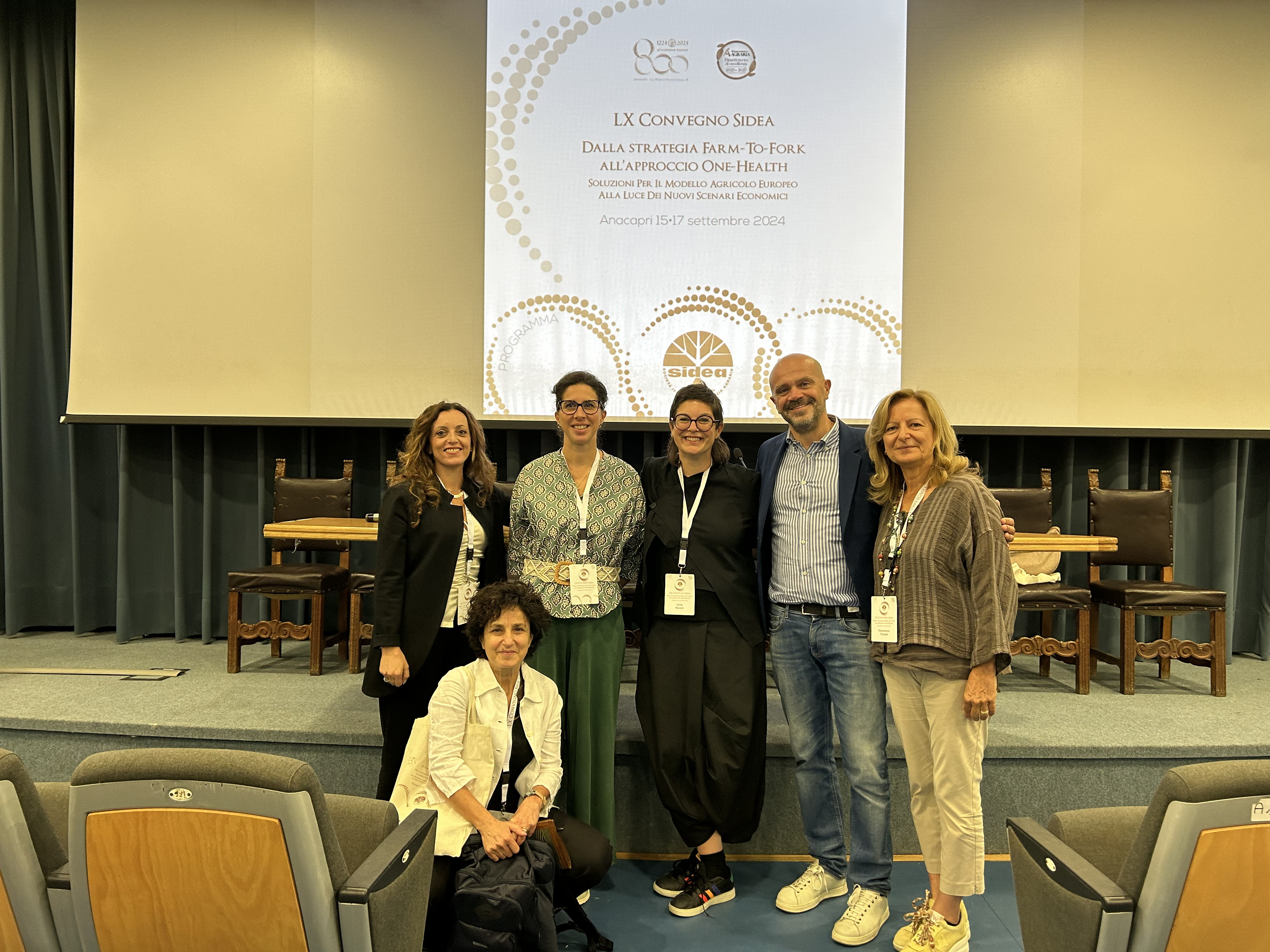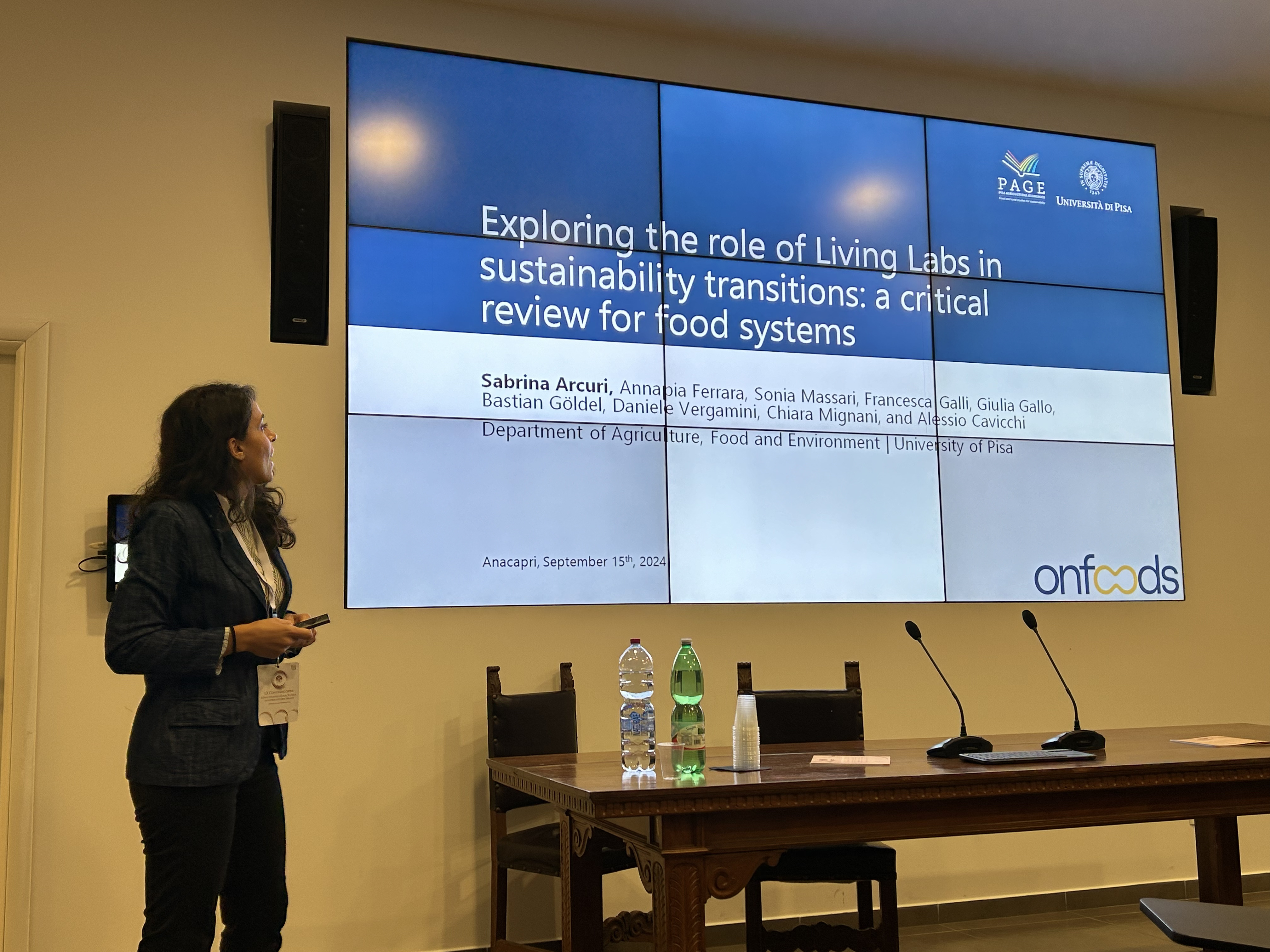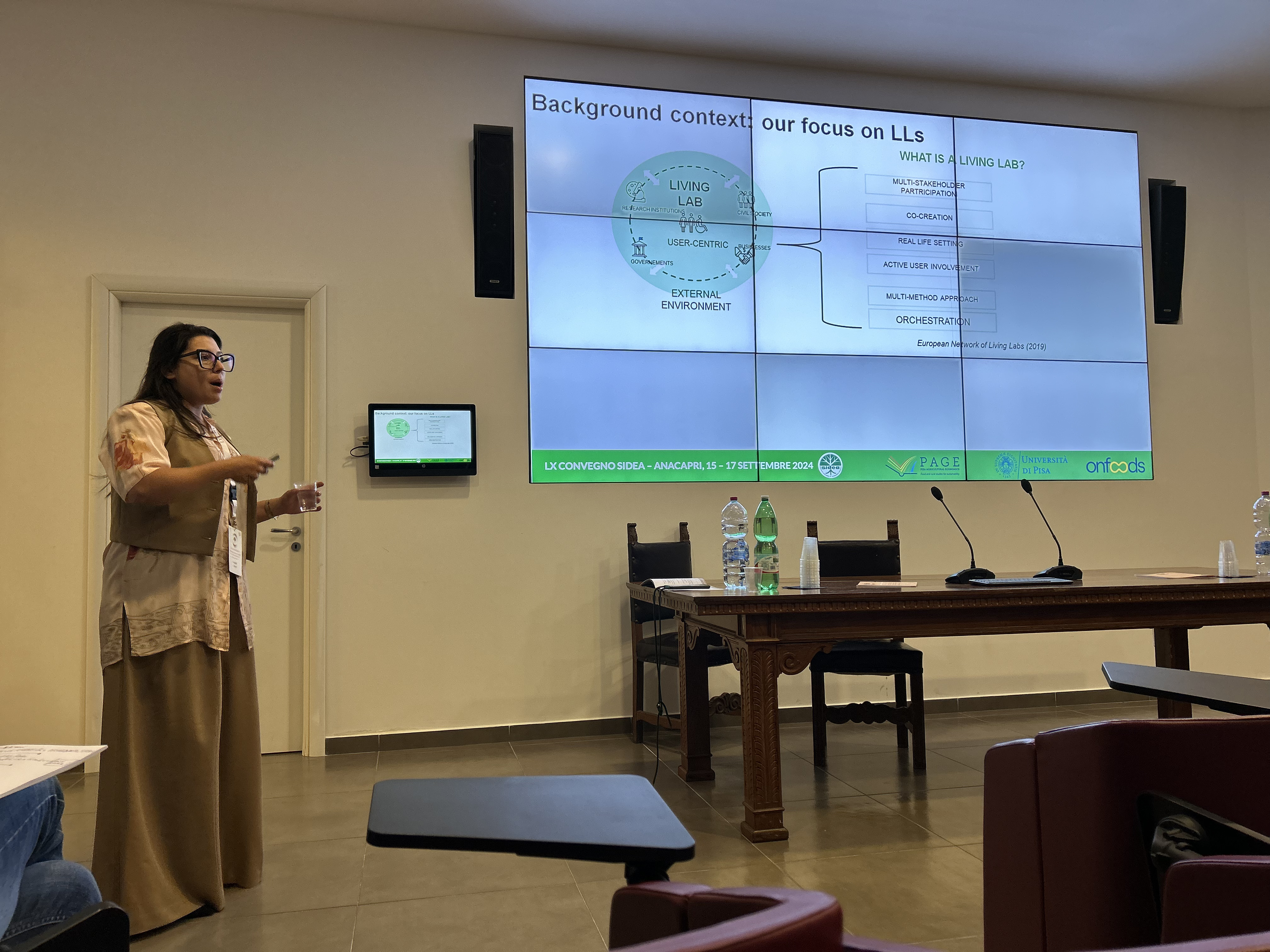Funded under the National Recovery and Resilience Plan (NRRP), Mission 4 Component 2 Investment 1.3, Theme 10.
The Evolution of Agricultural Economics Education and Research on Living Labs
The Contributions of the University of Pisa (Spoke 1, OnFoods) to the Anacapri Conference Held Last September.

Susanna Bonelli
Communication specialist
The Contributions of the University of Pisa (Spoke 1, OnFoods) to the Anacapri Conference Held Last September
On September 16th, during the 60th conference of the Società Italiana degli Economisti Agrari (SIDEA, Italian Society of Agricultural Economists), a special session was held dedicated to the evolution of agricultural economics education in the age of the digital and ecological transition, also known as the "twin transition".
Organized by SIDEA in collaboration with the Italian Association of Agricultural and Applied Economics (AIEAA), the session brought together experts and academics for an open dialogue on how to adapt educational content and teaching methodologies to meet these new challenges.
Additionally, the University of Pisa, as a participant in Spoke 1 of the OnFoods project, discussed in an afternoon session the role of Living Labs, highlighting their impact through mapping, monitoring, and scientific literature on the subject.
How Agricultural Economics Education Is Changing in the Era of the "Twin Transition"
On Sunday, September 16th, a special session titled "How Agricultural Economics Education Is Changing in the Era of the 'Twin Transition'" took place. Organized by SIDEA in collaboration with AIEAA, and open to the entire community of agricultural economists, the session was chaired by Angelo Belliggiano, Alessio Cavicchi, Maria Teresa Gorgitano, and Biancamaria Torquati.
The publication of the article "New Frontiers in Agricultural Business Education: Elements for a Debate" in the Rivista di Economia Agraria in 2023 marked an important moment of reflection for the field.
The dialogue began back in 2021 with a session organized during the SIDEA conference in Bologna and continued with the "Academic Knowledge in Transition" session at the Palermo 2022 conference. It further developed at the scientific-disciplinary level with an event hosted by AIEAA in February of this year, attended by some of the proponents of this session.
In this process, which has already seen the participation of numerous agricultural economists, scientific societies are developing a proposal to create a community of practice on education.
For all these reasons, the session held on Sunday, September 16th, in Anacapri was open to all members, inviting active contributions to a discussion on the following topics:
- The content driven by new educational needs in an era of digital and ecological transition;
- The teaching methodologies required for the development of new skills;
- The design of educational pathways linked to the increasing internationalization demanded of our Departments/Universities;
- The organization of degree programs through dialogue with local stakeholders.
Alessio Cavicchi led the presentation on the SIDEA working group. Maria Teresa Gorgitano and Biancamaria Torquati spoke on "New Contexts and Different Approaches to Teaching." Angelo Belliggiano discussed the role of stakeholders in the design of degree programs, considering not only new educational needs but also public engagement. Antonio Boggia focused on the possibilities for innovation and the development of educational themes, from environmental appraisal to bioeconomy. Lastly, Sonia Massari, Silvia Rolandi, and Francesca Galli addressed "Innovative Pedagogies and Participatory Approaches: Towards Building a Community of Practice."
The concluding remarks for this first session were entrusted to Alessio Cavicchi.

Contributions from the Department of Agricultural Economics at the University of Pisa
During the session organized by the University of Pisa as part of Spoke 1 of the OnFoods project, there was an extensive discussion on innovative pedagogies and participatory approaches, showcasing several examples, including the significant case study of the Tenuta Lab in Suvignano. Last June, this initiative engaged more than 20 participants in the OnFoods mentorship program.
Read also: "Innovative Research Practices: Empowering Early Career Scientists in Global Sustainability."
The Tenuta Lab experience emerged from several key needs: training future researchers and technicians means equipping them to work in transdisciplinary and collaborative contexts, tackling complexity, and developing new evaluation approaches. Additionally, there is a need to integrate the agricultural enterprise, seen as a system, into research ecosystems like Living Labs, which aim to foster collective and empathetic learning experiences that generate tangible outcomes.

Living Lab: Simulate, Participate, Understand
The GEN-YOU research project, coordinated by the University of Pisa and integrated into the activities of Spoke 1 of OnFoods, is dedicated to understanding and applying participatory methodologies such as Living Labs. A Living Lab serves as a small-scale social experiment within a supply chain or territory, actively involving various stakeholders. The idea is to project possible scenarios, select the most likely ones, and then focus on results that can be transferred to a broader context.
In this regard, the University of Pisa presented two interventions:
- “Exploring the Role of Living Labs in Sustainability Transitions: A Critical Review for Food Systems”, presented by Sabrina Arcuri.
- “Exploring the Role of Living Labs for the Sustainability of Agri-Food Systems”, presented by Annapia Ferrara.
Living Labs, as a multi-stakeholder approach, promote the sustainable transition of agri-food systems, and there is already a vast body of studies and scientific literature on this topic.
Within the OnFoods project, the University of Pisa is conducting a comprehensive and systematic study of the existing literature, aiming to highlight its strengths and weaknesses.
Additionally, the university is mapping Living Labs, focusing on projects funded through European community funds, particularly through Horizon 2020 and Horizon Europe programs.


Susanna Bonelli
Communication specialist
I skilfully craft communication messages for specific audiences and distribute them through appropriate channels. A perfectionist with a flair for teaching, I specialise in web copywriting, UX writing, content design, and content marketing.


